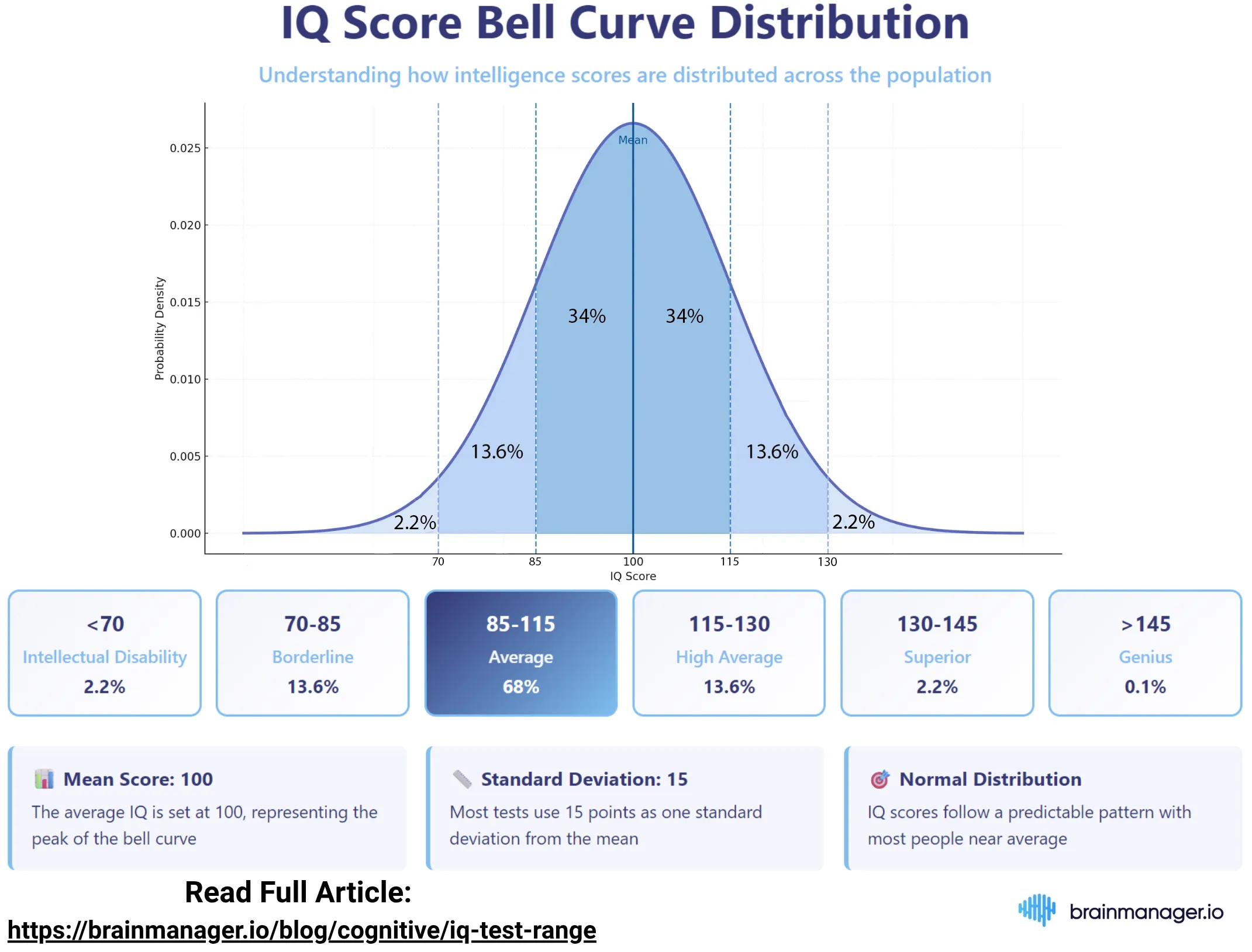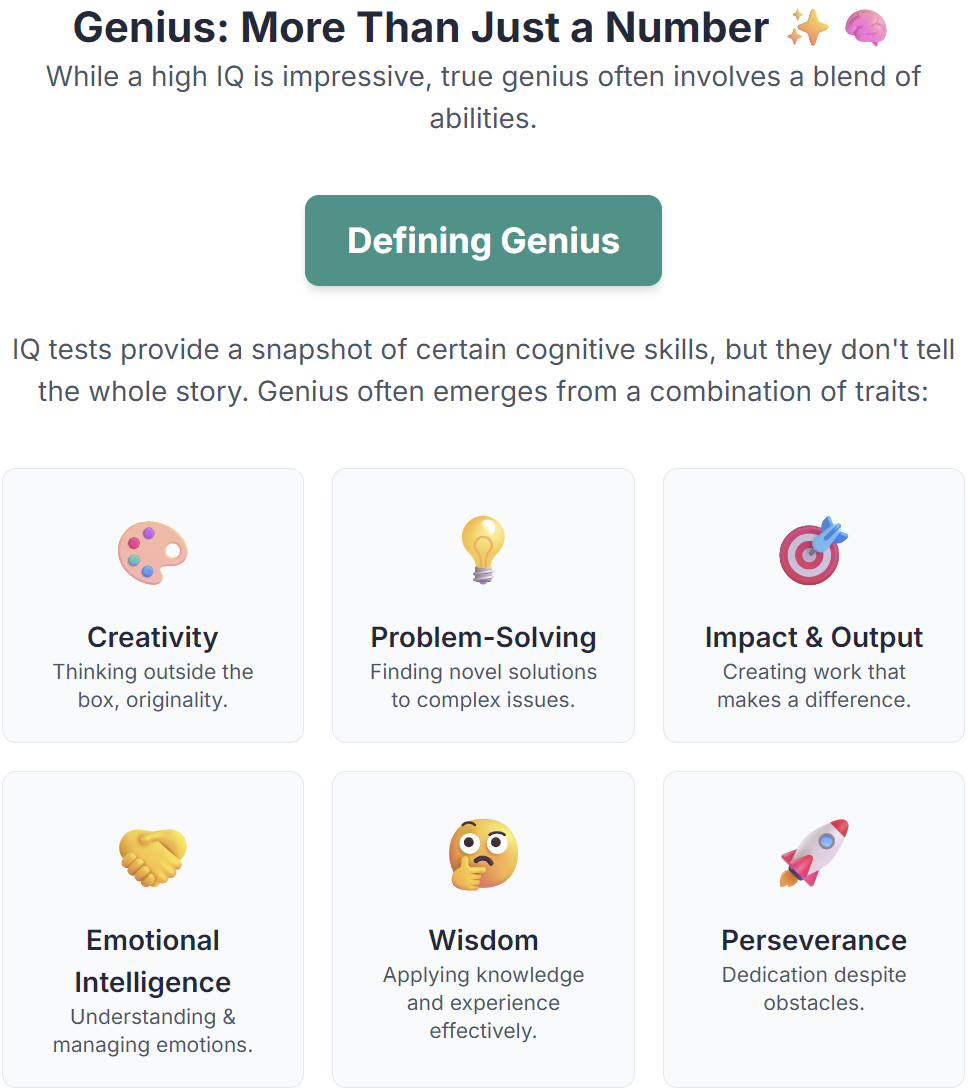Do You Have a Genius IQ? Learn the Score That Defines It
Ever wonder what makes someone a genius? In this article, we explore if there’s such a thing as a genius IQ score and what it means to be considered a “genius.” Read on to unlock the secrets of genius within you — and whether that’s dependent on the formal definition of genius based on IQ scores!


Back
4 mins read
At just 14 years old, Taylor Wilson taught himself nuclear physics and built a working nuclear reactor in his parents' garage. How could a kid achieve such an incredible scientific feat typically reserved for seasoned experts? Some might say Taylor Wilson is a genius or possesses superior intelligence — but what exactly does that mean?
Is genius solely defined by having an off-the-chart IQ score?
What is considered a genius IQ?
The concept of genius or genius IQ score has long captivated and perplexed society. We're in awe of Einstein, Mozart, and Marie Curie, who demonstrated profound intellectual ability and made groundbreaking contributions.
But pinpointing the qualities of superior intelligence remains an intriguing puzzle.
However, we'll explore these intricacies in this piece: "What is genius?" We'll look at the meaning of genius. Specifically, we'll consider whether towering IQ scores are the definitive measure of genius or if other factors play an equally vital role.
If you've ever wondered whether or not profoundly gifted people are as a result of their above-average intelligence quotient or pondered how meaningful an IQ test score truly is, then this is the blog for you. Let’s delve into the complexities of human intelligence and unravel who a genius truly is.
Related: Who Is the Smartest Person in the World?
What Is a Genius IQ Score
A genius IQ score is typically considered to be 140 or higher, based on Lewis Terman’s classification using the 1917 Stanford-Binet scale. However, this scale has been revised multiple times, and in some newer versions, a score of 160+ is often associated with genius-level intelligence. It's also important to recognize that different IQ tests use different scoring systems.
For instance, on the WAIS-IV, a score of 134 or above falls into the “very superior” range, which roughly corresponds to the genius category on the Stanford-Binet.
The Cattell IQ scale, another widely used system, operates on a different distribution. On this scale, genius-level IQ typically starts at around 148, reflecting the top 0.1% of the population. Cattell scores tend to be numerically higher than those from Stanford-Binet or WAIS for equivalent rankings.
While definitions vary slightly depending on the test and methodology, a good rule of thumb is to consider an IQ score between 130 and 160+ as falling within the "genius" or near-genius range, with 140+ often serving as the classic benchmark.
How to Know If You Have a Genius IQ on an IQ Test
While different IQ tests may use slightly different scoring systems, most are designed so that scores follow a bell curve, with the average IQ set at 100 and a standard deviation of 15 (or 24 for the Cattell scale). This means that only a small fraction of the population scores high enough to be considered in the "genius" range.
Statistically speaking, a score of 140 or above on most standard IQ tests places you in approximately the top 0.5% of the population. On the Cattell scale, a comparable score would be around 148 or higher, which corresponds to roughly the top 0.1%.
If you’re taking an online or unofficial IQ test, keep in mind that results can vary in accuracy. However, you can still use the general principle of percentiles:
- Top 2% (130+) – considered highly gifted
- Top 0.5% (140+) – considered genius-level or near-genius
- Top 0.1% (160+ or 148+ on Cattell) – exceptionally rare, often associated with extraordinary cognitive ability
Tip: No matter which test you take, check the scoring scale and standard deviation used. If your score is well above the average and falls into the top percentile brackets, there's a good chance you're testing in the genius range.
Understanding IQ Tests: Strengths, Limitations and the Genius IQ Score
An IQ or intelligence quotient is a score derived from IQ tests designed to assess human intelligence. These IQ tests measure abilities like logic, pattern recognition, processing speed, and word reasoning. Historically, IQ tests have been used with the intent to measure and predict school success.
While an IQ test provides a data point, it doesn’t capture the full scope of cognitive abilities contributing to intelligence. Important facets like emotional intelligence, social intelligence, creativity, wisdom, and practical problem-solving skills are often overlooked. So, having an average IQ, an above-average intelligence quotient, or soaring IQ scores doesn't affirm or refute your genius status. That explains the absence of a "genius" label on IQ test results.
That said, there's a premium on extraordinarily high IQ scores, which indicate potent intellectual giftedness. While there's no official cut-off, IQ scores above 140 are generally regarded as “genius IQ test scores.” Just 0.5% of the population falls into this rarified tier of cognitive ability.
Those who demonstrate these lofty IQ levels sometimes join elite societies like Mensa, an international high-IQ organization. Prospective Mensa members must score in the top 2% on an approved IQ test to gain entry into the exclusive ranks reserved for the most brilliant genius minds.
While IQ testing has limitations, we have seen technological breakthroughs come forth from individuals with high IQ scores. So, there's a premise for associating impressive IQ scores with genius-level cognitive prowess. However, genius involves a complex interplay of many factors beyond just soaring IQ scores.
Nurturing Your Unique Cognitive Abilities — Beyond a Genius, High, or Average IQ Score!
While a high IQ score hints at intellectual giftedness, true genius isn't just about having an off-the-chart IQ score. It is about using that ability to create something remarkable and make a lasting impact on the world.
So, the next time you wonder about genius, remember: it's not just about the test score. It's about what you achieve with your abilities.
What kind of genius might you unleash by pursuing your passions and cultivating your distinct intellectual wiring?
The path to achievement begins with asking that empowering question. And yes, there is a difference between being smart and intelligent!


Return to Blog










